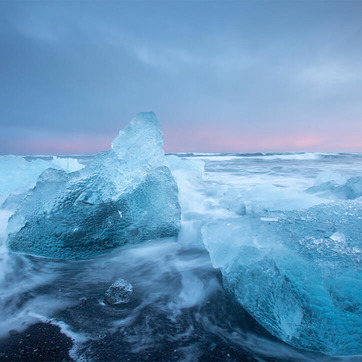The Antarctic effect: Omega-3 fatty acids in high purity
Towards the South Pole and then straight ahead! Antarctica, far from industry and shipping, is home to a small species of shrimp, the krill. The krill feeds exclusively on microorganisms and plankton from the ice-cold and untouched Antarctic Ocean. This purity of the diet is also crucial for krill oil. The valuable omega-3 fatty acids contained in krill oil are therefore considered to be of particularly high quality and unadulterated.
Some time ago, an amazing unique property of the Antarctic krill was discovered: the krill oil obtained provides the body with omega-3 fatty acids in a particularly easy-to-use form, as they are bound to phospholipids. Phospholipids are understood to be a kind of “utilisation aid” for omega-3 fatty acids. In this way, the unsaturated fatty acids pass from the liver directly into the bloodstream and are immediately available to the body. In addition to phospholipids, krill oil naturally contains the carotenoid astaxanthin, which gives krill its characteristic red colour.

Krill oil – premium raw material from the “end of the world”
The untouched nature of Antarctica is home to krill. At the “end of the world”, huge swarms live far away from industry and shipping routes. The main food of the krill are the microorganisms such as algae and plankton from the ice-clear water.
Krill is at the beginning of the food chain and it is precisely this purity that sets krill oil apart with its valuable omega-3 fatty acids. The krill oil obtained is also carefully tested for harmful substances in order to check its special purity.
Few catching vessels are able to fish in the inhospitable world of Antarctica. With ECO-Harvesting™ technology*, the krill is brought on board directly via a hose and processed immediately – the result is an end product of the highest quality. At the same time, this method effectively avoids unwanted bycatch. Of course, the strictly limited catch quotas of krill are also adhered to.
The extraction of krill oil is much more complex than with “normal” omega-3 products and it must be produced with great care. Gentle processing steps ensure that the valuable but sensitive ingredients such as phospholipids, astaxanthin and omega-3 fatty acids are preserved.
Krill oil can therefore be referred to as ECOSAFE. This ensures that krill fishing does not have a negative impact on the stocks of other marine animals such as whales, seals or seabirds.
*Eco-Harvesting™ is a trademark of Aker BioMarine
